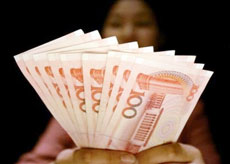The Chinese currency Monday strengthened to below 8 against the US dollar
for the first time since last July's revaluation.
Shanghai-based China Foreign Exchange Trade System reported that the daily
benchmark, or the central parity rate for the US dollar, stood at 7.9982 yuan,
falling below 8 yuan for the first time in 12 years.

A clerk at an foreign
currency exchange desk at a hotel shows Chinese yuan banknotes in
Shanghai, China, in this July 22, 2005 file photo. China's official
exchange rate rose Monday, May 14, 2006 to 7.9982 yuan per U.S. dollar,
its highest level since a revaluation in July, the government said.
[AP] |
The rate was 8.0082 on Friday.
The currency traded at a low of 7.9972 per US dollar
Monday but ended at 8.003 at 5:30 pm, according to the system.
The United States welcomed the rise in China's currency.
"Greater flexibility in China's exchange rate is something we've long
advocated," US Treasury Department spokesman Tony Fratto said Monday in response
to the appreciation in China's currency.
Traders said the market movements show the renminbi exchange rate is more
flexible despite some international criticism that the currency should further
appreciate.
Finance expert Tan Yaling with Bank of China said the breaching of the 8-yuan
barrier is "actually not a surprise. There were intense market expectations (for
the dollar-yuan exchange rate) to fall below 8," she said.
"Although the central bank expects a stable exchange rate, the hopes (for
yuan appreciation) of overseas and domestic institutions are high."
She said China's robust economic growth, hefty bank lending and the world's
largest foreign exchange reserves combined to push the yuan higher.
A State Administration of Foreign Exchange official said yesterday that
market forces should be given full play in determining the currency's value.
A Standard Chartered prediction is that the yuan would rise to 7.8 against
the dollar by the end of this year; and Wang Zhihao, an economist at the bank,
said he believes the yuan's value would stay on the upside in the short run.
Han Fuling, a finance research fellow with Central University of Finance and
Economics, said he believes that the appreciation of the yuan would attract more
overseas funds to China's stock market.
In a statement published Monday, the People's Bank of China (PBOC), the
central bank, pledged that the country would further improve the renminbi
exchange rate regime.
It will try hard to bring down the trade surplus and achieve a trade balance.
The authorities will also expand channels for outbound capital investment and
gradually realize the full convertibility of the yuan under the capital account.
China last July unexpectedly reformed its decade-old foreign exchange rate
mechanism, allowing the yuan to appreciate by 2 per cent against the US dollar
to 8.11 and pegging the yuan to a basket of currencies instead of the greenback
alone.
But it still faces international pressure to let its currency appreciate
further, given the mounting trade surplus with major countries like the United
States.
Some US lawmakers have been pushing for faster yuan gains to narrow their
country's trade deficit with China.
But top Chinese officials have been reiterating that instead of a one-off
revaluation, the exchange rate regime will be made more flexible gradually.
In a May 10 report to the Senate, the US Treasury Department decided against
accusing China of tampering with its exchange rate, acknowledging the positive
measures adopted by the Chinese Government to open up the financial market and
promises to allow the currency to trade more freely.
Foreign Ministry spokesman Liu Jianchao said on May 11 that the government
would continue to push for the reform of further exchange rate flexibility.
Meanwhile, to cushion the impact of the ballooning trade
surplus and foreign exchange reserves on the domestic economy, the central bank
is likely to further tighten monetary policy to curb a rebound of loan and
investment growth, said Gao Shanwen, chief economist at Everbright Securities.